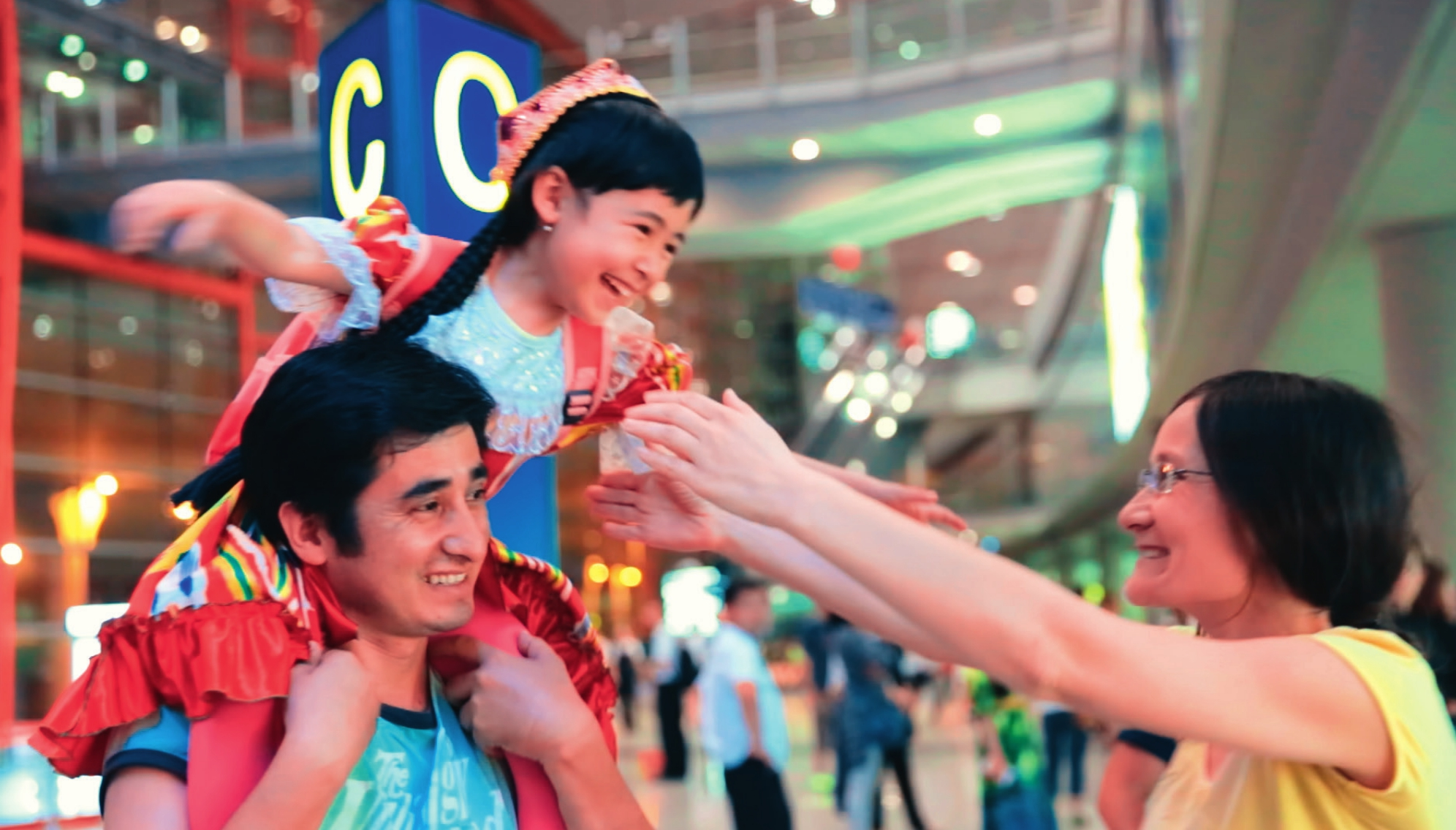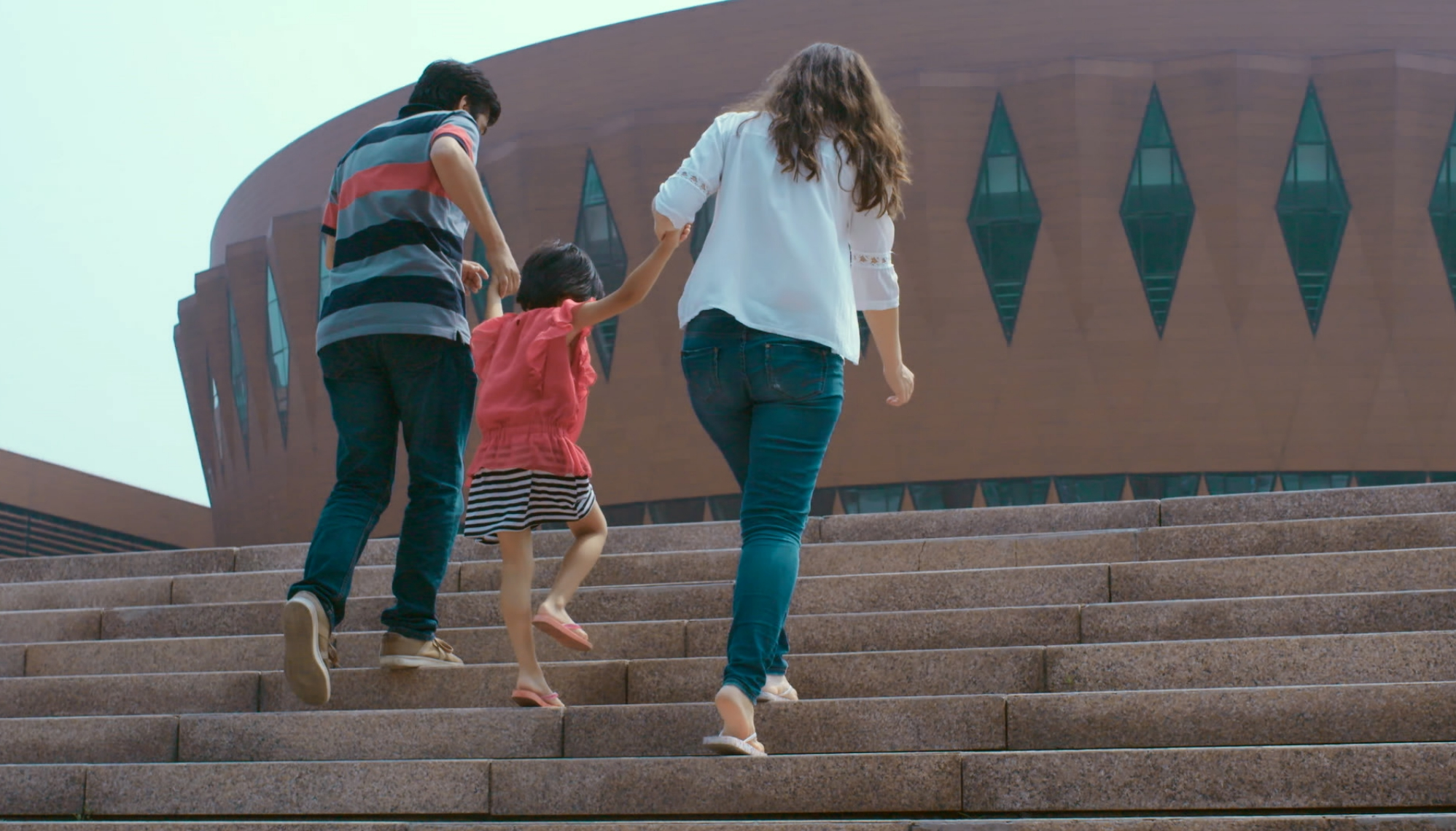Halidan Abudulkarim: I can easily communicate in Chinese, but at times I have felt something missing from within me. I realized it was my mother tongue only after I had got married.
My name is Halidan Abudulkarim, from Yili, Xinjiang. My husband Abudulkarim Abuliz is from Yecheng, Xinjiang. We are both Ph.D. students at Tsinghua University. I study in the Computer Science Department while he studies in the School of Arts and Sciences. Our daughter, Itulik Abdukrim, is with us in Beijing and we are looking for a kindergarten for her.
Next to the computer in my lab stands a photograph of my father, who is my role model. I admire him greatly! Every time I learn something new or achieve something, I kiss that photo. If I feel I’ve failed to live up to his expectations, I turn the photo to the other side out of shame of looking at him. My late father was a senior doctor who received four years of excellent training from a big hospital in Shanghai and authored many high-quality papers. He was a good husband and father, a filial son, and a great educator who managed to send all four children to college.
We lived downtown while my grandma lived in a suburban village. My father tried to persuade grandma to join us in the city, but she said she wasn’t used to urban life. So, my father hired a nanny to take care of her. On weekends, he would visit her regularly. When the villagers got sick, they would go and see him there. Knowing the villagers had a hard time making ends meet, he prescribed them inexpensive, but highly effective, medicine. His loving care had earned him a good reputation and close and strong ties with patients. On the day of his funeral. A huge crowd came to the mosque to mourn his death and pray for him.
Before enrolling in Tsinghua University, my husband and I had never engaged in any scientific research. My husband was originally a teacher in Yecheng. When he realized he didn’t fit in that environment, he went to graduate school at Xinjiang University. I also attended graduate school at Xinjiang University after studying and working for some years in Xi’an, Shaanxi Province. We were gradually attracted to each other due to common interest in academic studies.
I attended Mandarin-based schools since elementary school while my husband went to Uyghur-based schools. This served as a bonus rather than an issue of concern for us. We were married on July 6, 2009, one day after the violent incident in Urumqi. Due to that incident, we had to cancel our wedding in Urumqi even though we had already made full preparations. We took our marriage vows and later held a make-up wedding in my hometown.
After finishing graduate school, we tried to find steady jobs, but our wages were too low for the high prices of Urumqi. So, my husband suggested we pursue Ph.D. studies at Tsinghua University and we began preparing for the admission tests. I helped him with English while he helped me with my major of computer science. We were both admitted. We arrived at Tsinghua after midnight and were supposed to register at 7:00 a.m. With no place to stay, we were thinking about finding a wooden bench or something to sit on until daybreak when a warm-hearted student offered to have us stay in a lab. So, we spent the night on a couch in that lab.
All students from Xinjiang are probably aware of the huge gap between them and those from inland provinces. Xinjiang students typically have very weak academic foundations. Most other students are either directly admitted from Tsinghua or from among the best candidates in other parts of China. Their English proficiency makes it very easy for them to read professional research papers. I was so far behind I could hardly handle my first semester, so I was under enormous pressure. I basically wept through my first year, but improved in the second. My professors have been a great help. Not only are they great teachers and researchers, they are great people of character. It is a blessing to learn from high-caliber people as they know how to help you turn pressure into drive. My research field is natural language processing and my focus is artificial intelligence research on the Uyghur language. It’s a new area that no one has touched upon before. If I could accomplish something in this field, it would be mean a lot for me and my late father.
What is most important for a woman? I often ask myself. I have strong interest in scientific research and certainly wish to achieve something in this field, but it doesn' t mean I want to be an amazon because family means a lot to me. I may as well give up something for my family' s sake.
Apart from school work, another big challenge for us is our daughter’s school enrollment. Itulik was born before we took our Ph.D. admission tests. We didn’t have her with us during the first year because we needed to get settled and familiar our new environment. We needed a dorm of our own to live a normal life as husband and wife. We submitted numerous applications and talked directly with the relevant officials in charge, but never got anywhere. During the second year, we simply brought our baby to Beijing because we missed her so much. It was very difficult to find her a suitable kindergarten in Beijing. It would have been much easier if we could enroll her at the Tsinghua University Kindergarten, but we couldn’t due to restrictions.
After at least a dozen trips and skipping a lot of classes, I finally found out from a friend that the kindergarten attached to Minzu University of China was a good fit, but the kindergarten did not enroll our daughter until after I had pled with the director directly. The kindergarten was normally for children of parents who either worked or studied at the university only.
I sent my daughter to kindergarten every morning before heading for the lab. My husband picked her up in the late afternoon. On weekends, we took turns taking care of her. Our days were packed, but well-planned, so our school work was not affected. We were very happy to have her with us.
As the pressure from school mounted, we had to send our daughter back to Xinjiang. We first had to make sure we could graduate as planned. While in Beijing, she learned enough Mandarin and English to lay a fairly good foundation. My concern was she could lose out on her mother tongue. Such thinking can possibly only be shared by those who have been abroad quite some time or lived in alien cultural environments. Because I attended Mandarin-based schools and lived in a Mandarin environment since childhood, I forgot a lot of my mother tongue. I can easily communicate in Chinese, but sometimes I feel there is something missing from my heart. Only after dating and marrying my husband did I realize it was my mother tongue that was missing. He was the one who brought it back for me. One cannot afford to lose one’s essential being. That’s why we enrolled our daughter in a Uyghur-based kindergarten in Xinjiang. Now, we must worry again about which school to send our daughter to in Beijing. Schools in Beijing are divided according to school districts based on hukou. We want to be a positive influence on our daughter’s future with our academic endeavors, but we also want her to grow up in our care and custody and not be a “child left behind.”
My husband and I must write high quality dissertations to graduate with Ph.D. degrees, and our common dream is to make academic achievements. On the other hand, I want to be a good mother and provide our daughter with a good learning environment. This is my second dream.
Since the summer of 2015, our daughter has been back with us. The moment I saw her at the airport, I believed all our effort had paid off.
(selected from Xinjiang: Beyond Race, Religion, and Place of Origin by Kurbanjan Samat, translated by Wang Chiying, published by New World Press in 2017)

